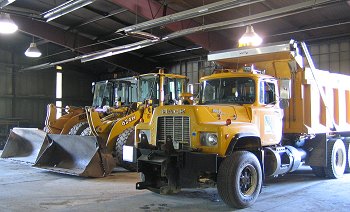- By Dan Veaner
- News
 Print
Print  Diesel fuel was as high as $5.15 per gallon at the pump in Ithaca on Monday. Lansing gas stations were charging $4.29 for regular gas. In Lansing that could mean that road maintenance will be cut back 20% or more this year. Even though municipalities don't have to pay fuel tax, prices have been rising much faster than predicted. "It's a guessing game," says Highway Superintendent Jack French. "It's tough. We only budgeted $2.65 for diesel fuel this year and we're already at $3.87. It's a crap shoot, you just don't know. And gas is the same way. We had budgeted $2.70 and now we're paying $3.24."
Diesel fuel was as high as $5.15 per gallon at the pump in Ithaca on Monday. Lansing gas stations were charging $4.29 for regular gas. In Lansing that could mean that road maintenance will be cut back 20% or more this year. Even though municipalities don't have to pay fuel tax, prices have been rising much faster than predicted. "It's a guessing game," says Highway Superintendent Jack French. "It's tough. We only budgeted $2.65 for diesel fuel this year and we're already at $3.87. It's a crap shoot, you just don't know. And gas is the same way. We had budgeted $2.70 and now we're paying $3.24."Lansing has almost 95 miles of town roads, which Highway Department workers maintain in the summer. In the winter they plow county and Village of Lansing roads as well as town roads. The Town owns eight 10-wheel dump trucks, three single-axle dump trucks that are all used for hauling and plowing, as well as four pickup trucks, some graders and loaders, an excavator, and a roadside mower. So fuel is needed for just about everything the department does, plus the cost of blacktop, gravel, salt and sand are all going up.

"It went up hugely," French says. "For this summer we're set at a county bid for gravel and sand and they didn't go up too badly. But I'm sure it's going to next year. I haven't gotten the new prices for salt yet, but that's also going to go up. It went up quite a bit last year."
Lansing is luckier than other communities in one way: French can send his trucks just down the road to Cargill to get salt, so the Town doesn't have to pay for transporting it. And Lansing pays for much of its expendable materials through a county contract, which means greater buying power for the county and lower prices for the participating municipalities.
The town will also save $10,000 this year by borrowing Tompkins County's paver. It usually costs between $8,500 and $10,000 to rent a paver for a month. "With intermunicipal cooperation we're using the County's paver and we'll pay them back by hauling some blacktop when they start paving," French says. "So hopefully that $10,000 will go to pay for a little more fuel."
The whole crew works on Lansing's roads in the summer, with a crew of 15 hauling blacktop and paving the roads one at a time. French says that all eight 10-wheelers are used to constantly haul blacktop. Nine roads are scheduled for hot mix paving this year, and Salmon Creek Road will receive a layer of cold mix paving. A few others will get a stone and oil treatment, for a total of 12 roads for the season.
French shoots for paving ten miles of road per year, which puts all the town roads on a ten-year maintenance cycle. At this point he says that even with savings from the paver the Town will be lucky if it can afford to pave the eight and a half miles scheduled for this year. In addition to the high cost of fuel, blacktop prices are rising fast undoubtedly because blacktop is also an oil product. From May to June its cost rose from $52 per ton to $60.
Despite nearly 100 degree heat French scheduled the work now before prices rise even more. "That's why we started paving Monday," French says. "It went up $10 a ton in one month. It takes quite a bit to do a mile of road, 1450 tons for one mile of road at 2 1/4 inch depth so it's very costly. From May to June it went up $10 a ton. Undoubtedly that eight and a half miles is going to have to be cut."

Highway Superintendent Jack French
French is rightly proud of his widely well regarded department and the people who work there. He balks at an idea some county leaders have floated to consolidate town highway departments to realize an efficiency of scale in buying power. He notes that while at one time state legislators were pushing the idea of consolidation, that the state is backing away from that idea now. But he says that some counties are still considering it.
"You can look at all of the roads in the Town of Lansing and you can definitely tell what's a town road and what's a county road," he says. "Consolidating is not good for Lansing at all. I've really been pushing our town board to be against it at county and state meetings they go to. It would help the Town of Caroline and the Town of Groton, but it certainly wouldn't help the Town of Lansing."
Meanwhile French says that estimating fuel costs is difficult at best in the current environment. Road construction and plowing are the two biggest budget items for the Highway Department, but you can't cut plowing. With materials running about seventy or eighty thousand dollars for a mile of road, road construction is about the only budget item that can be cut.
"You turn on the TV and one analysis says that prices are at the top and will start going down," he says. "Then you turn the channel and they say that prices are going to keep on going up. I'm really not sure what we're going to do to save money. More than likely it's going to have to come out of our road improvement schedule. The problem is that starts putting you behind. If you start doing six or seven miles of road it starts putting you behind and then you get into some serious problems with your roads."
----
v4i23



